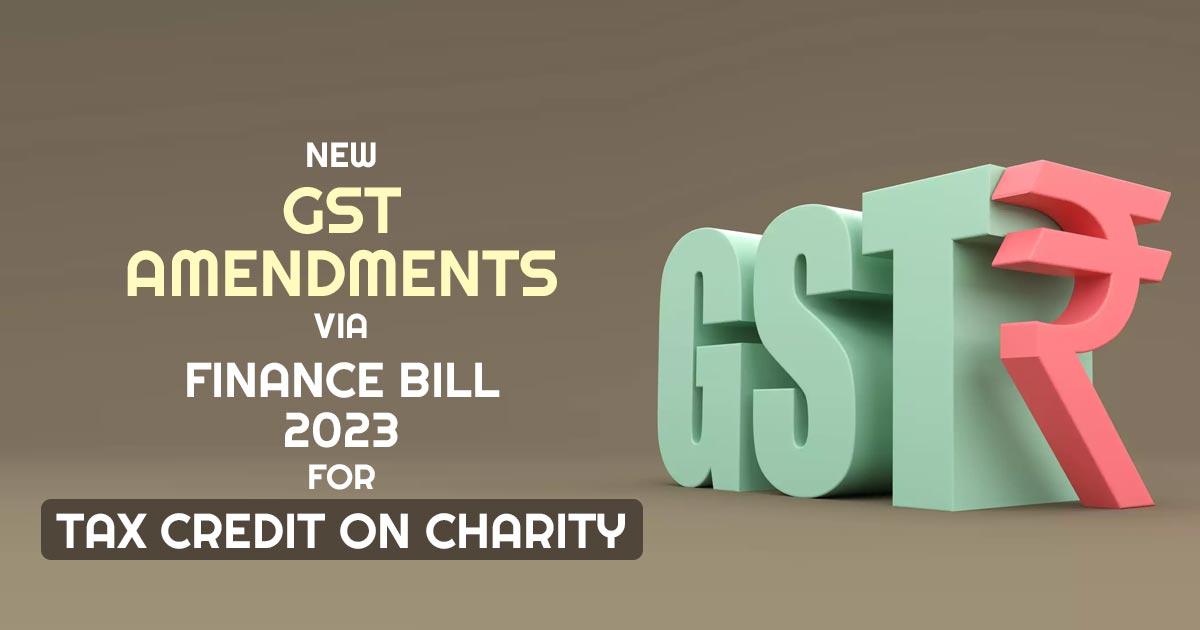
Through the Finance Bill, 2023, the government is likely to make changes to the Goods and Services Tax (GST) law that will prevent businesses from receiving tax credits for the purchases of goods and services that they make on behalf of the community as part of their corporate social responsibility (CSR) obligations.
According to two people familiar with conversations in the Central government, this would imply that the taxes that are included in the goods and services utilized in CSR operations cannot be offset against the company’s overall GST burden. “This would be a major change to the GST law,” one of the people told. The GST Act’s (16) and (17) provisions dealing with an input tax credit, or GST ITC will be changed.
One of the pillars of GST is the opportunity for businesses to claim a credit for the taxes they paid on purchases, ensuring that there is no tax on tax and that tax only applies to the value added at each level of the supply chain. However, due to conflicting directives from several advanced governing bodies, it has been difficult to claim credit for GST paid while purchasing goods and services to fulfil CSR requirements. According to the first person cited above, this called for legislative revisions to clarify the air. Changes to several tax laws, including the Income Tax Act, Customs Act, CGST Act, and IGST Acts, are enacted through the yearly Finance Bill.
Read Also: Telangana AAR Allows CSR Expenses to be Claimed As GST ITC
It is analysed by the advance ruling heads in Uttar Pradesh, Telangana, Gujarat and Kerala that if the taxes furnished as a part of CSR activities would be the “in the course or furtherance of his business”, for the taxes filed on purchases, the credit criteria to be available and have furnished the opposite views. GST on the inputs purchased for CSR is available as credit stated by the Telangana State Authority for Advance Ruling and the Authority for Advance Ruling in Uttar Pradesh, the Gujarat and Kerala authorities ordered on the same for the particular question specify that the orders which would be available in the public domain.
The Telangana State Authority for Advance Ruling highlighted in its order dated October 20, 2022, that the CSR spending required by the Companies Act is an investment made to advance the enterprise. The order stated, “Hence the tax paid on purchases made to meet the obligations under corporate social responsibility will be eligible for an input tax credit under Central GST and State GST Acts.” UP authority, in its January 2020 ruling elaborated, CSR spending would not be voluntary and is a legal responsibility beneath the law of the company and therefore the tax credit for that does not restrict. The CSR activities would not be included in the normal business procedure and hence would not get qualified for the ITC, the Gujarat Authority for Advance Ruling in its August 2021 order described.
This step to mention in the CGST act, on the CSR, the ITC shall not be available for the businesses would be concerned with large companies such as Reliance Industries, TCS, Tata Sons, HDFC Bank Ltd., and ONGC, these are the highest CSR spenders according to official data. In the financial year 2021, Reliance Industries spent Rs 922 crore on CSR after that TCS with a spending of Rs 674 cr and Tata Sons Rs 546 crore, HDFC Bank Ltd. spent Rs 534 crore and ONGC Ltd. spent Rs 531 crore. India Inc. spent more than Rs 25,700 crores on CSR in the Fiscal year 2021.
Important: Easy Guide to Capital Goods Under GST with ITC Eligibility
Over the past few years, industry spending on Corporate Social Responsibility has increased significantly from the over Rs 14,300 crores invested in FY17. The government put into action a penalty clause for failing to meet CSR spending obligations in January 2021 and permitted companies to spend more than they were required to, which may be deducted from their required future expenditure.
A company must devote 2% of its average net profit over the previous three years to CSR initiatives if it has a net worth of at least 500 crores, a turnover of at least 1,000 crores, or a net profit of at least five crores. Regardless of whether they get tax credits, businesses are required to spend the sum calculated in this way on CSR. Receiving an input tax credit has the benefit of allowing the business to utilize it to offset at least some of the GST owed on sales.
Emails sent on Friday requesting responses for the article to the GST Council Secretariat and the finance ministry went unanswered as of the time of publication.